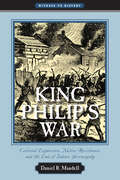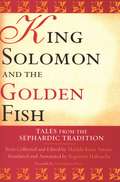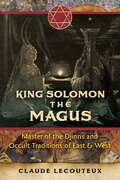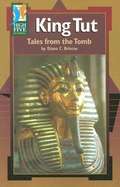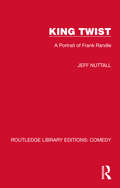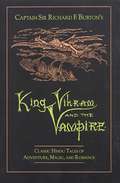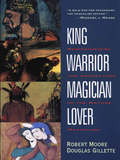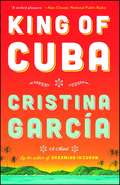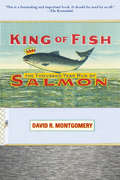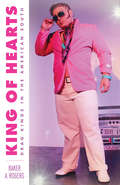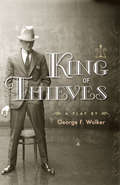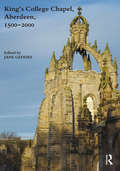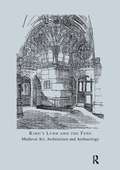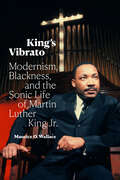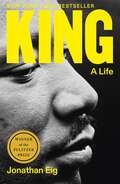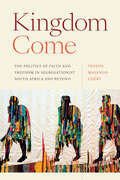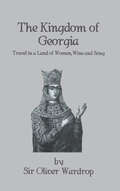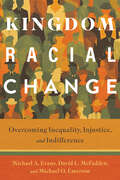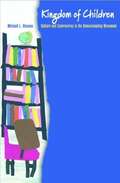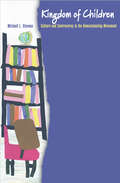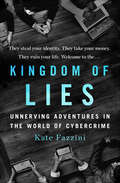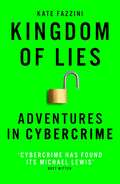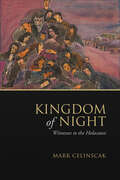- Table View
- List View
King Philip's War: Colonial Expansion, Native Resistance, and the End of Indian Sovereignty (Witness to History)
by Daniel R. Mandell2010 Outstanding Academic Title, Choice MagazineKing Philip's War was the most devastating conflict between Europeans and Native Americans in the 1600s. In this incisive account, award-winning author Daniel R. Mandell puts the war into its rich historical context.The war erupted in July 1675, after years of growing tension between Plymouth and the Wampanoag sachem Metacom, also known as Philip. Metacom’s warriors attacked nearby Swansea, and within months the bloody conflict spread west and erupted in Maine. Native forces ambushed militia detachments and burned towns, driving the colonists back toward Boston. But by late spring 1676, the tide had turned: the colonists fought more effectively and enlisted Native allies while from the west the feared Mohawks attacked Metacom’s forces. Thousands of Natives starved, fled the region, surrendered (often to be executed or sold into slavery), or, like Metacom, were hunted down and killed.Mandell explores how decades of colonial expansion and encroachments on Indian sovereignty caused the war and how Metacom sought to enlist the aid of other tribes against the colonists even as Plymouth pressured the Wampanoags to join them. He narrates the colonists’ many defeats and growing desperation; the severe shortages the Indians faced during the brutal winter; the collapse of Native unity; and the final hunt for Metacom. In the process, Mandell reveals the complex and shifting relationships among the Native tribes and colonists and explains why the war effectively ended sovereignty for Indians in New England. This fast-paced history incorporates the most recent scholarship on the region and features nine new maps and a bibliographic essay about Native-Anglo relations.
King Solomon and the Golden Fish: Tales from the Sephardic Tradition (Raphael Patai Series in Jewish Folklore and Anthropology)
by Reginetta Haboucha Matilda Koén-SaranoOrality has been central to the transmission of Sephardic customs, wisdom, and values for centuries. Throughout the Middle Ages, Spanish Jews were known for their linguistic skills, and as translators and storytellers they were the main transmitters of Eastern/Islamic culture to the Christian world. Derived from a distinguished heritage, Judeo-Spanish storytelling has evolved over a five-hundred-year historical journey. Constant contact with the surrounding societies of the past and with modern Israeli influences, making it more universal than other Sephardic oral genres. Told in order to entertain but also to teach, Judeo-Spanish folktales convey timeless wisdom and a colorful depiction of Sephardic communities up to the first half of the twentieth century.King Solomon and the Golden Fish is a selection of fifty-four folktales taken from Matilda Koén-Sarano's collection of stories recorded in Ladino (Judeo-Spanish) and translated by Reginetta Haboucha into fluent and idiomatic English that preserves the flavor and oral nuances of each text. Haboucha provides commentary and annotations to the folktales that enlighten both the academic and the lay reader, making this book at once appealing to scholars and enjoyable for the general public. King Solomon and the Golden Fish is divided into six main thematic sections: Supernatural Tales, Tales of Fate, Tales of the Prophet Elijah, Romantic Tales, Tales of Cleverness and Wisdom, and Jokes and Anecdotes. These folktales remain a powerful link between modern-day Spanish Jews and the Hispano-Jewish legacy--this collection passes along that legacy and provides a source of the customs and values of Sephardic Jews.
King Solomon the Magus: Master of the Djinns and Occult Traditions of East and West
by Claude Lecouteux• Explores the schools of Solomonic magic around the world and works such as The Greater and Lesser Keys of Solomon the King and The Hygromancy of Solomon • Examines Solomon&’s magical possessions, including his famous ring that gave him command over animals, weather, demons, genies, and djinns, as well as his amulets, remedies, exorcisms, and charms • Looks at the extensive presence of Solomon in folklore around the world, including in Armenia, Malaysia, Russia, Bulgaria, Morocco, India, and Egypt Looking at the Solomonic magical tradition and Solomon&’s profound influence on esoteric traditions around the world, Claude Lecouteux reveals King Solomon not only as one of the great kings of prehistory but also as the ancient world&’s foremost magician and magus. Examining the primary sources on Solomon, such as the Bible, the Koran, and the writings of Flavius Josephus, the author explores Solomon&’s judgments, his explorations, his literary and scientific works (including an herbal), and his constructions beyond the eponymous temple, such as the copper city in Andalus built by the djinns and the baths of Sulayman. He also looks at Solomon&’s magical possessions, such as his famous ring and the Philosopher&’s Stone. The author examines the supernatural powers granted to Solomon by his ring, which he received from the angel Gabriel, including command over animals, weather, and demons, and explores in detail Solomon&’s power over genies and djinns.Following the esoteric threads hidden within the primary sources on Solomon, Lecouteux reveals the work of Solomon the Magician, exploring his amulets, remedies, exorcisms, charms, and his influence on Arab and Western magic. Providing illustrations of sigils, talismans, and other magic symbols related to Solomon, the author examines the schools of Solomonic Folkloremagic and works such as The Greater and Lesser Keys of Solomon the King and The Hygromancy of Solomon. He then looks at the extensive presence of Solomon in folklore worldwide, including in Armenia, Israel, Malaysia, Eastern Europe, Russia, Morocco, India, Mongolia, and among the Abyssinians of Ethiopia and the Copts in Egypt. He also looks at Solomon&’s role within the Bulgarian tradition from which the Cathars derived. Painting an in-depth portrait of Solomon the Magician-King, Lecouteux reveals how this legendary magus left a deep impression upon the occult, magical traditions, and philosophies of the ancient world that can still be felt to this day.
King Tut: Tales From the Tomb
by Diana C. BriscoeReaders of all ability levels will want to read these high-low books from 5 high-interest nonfiction subject areas: sports, history, biography, adventure, and science. Each easy-to-read book explores a fascinating narrative account of the subject. This all-new series features historical photographs, full-color graphics, glossary words on each page, and a contemporary chapter-book format. Copyright © Libri GmbH. All rights reserved.
King Twist: A Portrait of Frank Randle (Routledge Library Editions: Comedy)
by Jeff NuttallBorn in Wigan in 1901 and a childhood friend of George Formby, who was later to become his chief rival, Frank Randle was one of the greatest music-hall comedians of all time. His theatre career started in 1916, when he appeared as an acrobatic artist under the name of Arthur Twist. It was not until the thirties, however, that he achieved his greatest popularity and notoriety as a comedian whose wild, manic temperament introduced a fresh note of invention into popular entertainment. For ten years he ran his own touring company, Randle’s Scandals, playing to enthusiastic audiences all over the country. He also made a number of shoe-string movies and was the star of Blackpool’s most distinguished summer-season show. During the early fifties his health declined and he died in Blackpool in 1957. Originally published in 1978, Jeff Nuttall’s account of Frank Randle is both a portrait of a ‘very, very, funny man’ and the story of his own search as he pieced that portrait together by talking to Randle’s acquaintances, friends, colleagues and relations. What emerges from his narrative is a beautifully recorded analysis of the ways in which working-class values are expressed in popular entertainment and are thus ritualised by it. The image Nuttall builds of Randle also allows him to explore the perennial theme of the clown as outsider and, with the passing of Randle, he acknowledges the passing of a certain naïve optimism which Randle so expressively embodied.
King Vikram and the Vampire: Classic Hindu Tales of Adventure, Magic, and Romance
by Captain Sir BurtonTranslated by the noted Victorian Orientalist, Sir Richard F. Burton, from the original Sanskrit, these ancient Indian folk tales influenced such later works as 1001 Arabian Nights and Boccaccio's Decameron. First published in 1870, these stories will entertain and delight modern readers while illuminating the life and customs of classical India.
King Warrior Magician Lover: Rediscovering the Archetypes of the Mature Masculine
by Robert Moore Douglas GilletteThe bestselling, widely heralded, jungian introduction to the psychological foundation of a mature, authentic, and revitalized masculinity.
King of Cuba
by Cristina GarciaTold with wry wit and keen insight, this entertaining and richly satisfying story about a fictionalized Fidel Castro and an octogenarian Cuban exile obsessed with seeking revenge against the dictator--from the National Book Award finalist and author of Dreaming in Cuban. El Comandante, an aging Castro-like dictator shambles about his mansion in Havana, visits a dying friend, tortures hunger strikers in one of his prisons, and grapples with the stale end of his life that is as devoid of grandeur as his nearly sixty-year-old revolution. Across the waters in Florida, Goyo Herrera, a Miami exile in his eighties, plots revenge against his longtime enemy--the very same El Comandante--whom he blames for stealing his beloved, ruining his homeland, and taking his father's life. Shifting between the two men with great resonance and humor, and peppered with the rabble of other Cuban voices that create a patchwork of history's unofficial stories, García's novel plumbs the passions and realities of these two Cubas--on the island, and off. Writing at the top of her form, García returns to the territory of her homeland and her bestselling novel Dreaming in Cuban.
King of Cuba: A Novel
by Cristina GarciaA "darkly hilarious" (Elle) novel about a fictionalized Fidel Castro and an octogenarian Cuban exile obsessed with seeking revenge by the National Book Award finalist Cristina García, this "clever, well-conceived dual portrait shows what connects and divides Cubans inside and outside of the island" (Kirkus Reviews).Vivid and teeming with life, King of Cuba transports readers to Cuba and Miami, and into the heads of two larger-than-life men: a fictionalized Fidel Castro and an octogenarian Cuban exile obsessed with seeking revenge against the dictator. García's masterful twinning of these characters combines with a rabble of other Cuban voices to portray the passions and realities of two Cubas--on the island and off-- in a pulsating story that entertains and illuminates.
King of Fish: The Thousand-Year Run of Salmon
by David R. MontgomeryThe salmon that symbolize the Pacific Northwest's natural splendor are now threatened with extinction across much of their ancestral range. In studying the natural and human forces that shape the rivers and mountains of that region, geologist David Montgomery has learned to see the evolution and near-extinction of the salmon as a story of changing landscapes. Montgomery shows how a succession of historical experiences -first in the United Kingdom, then in New England, and now in the Pacific Northwest -repeat a disheartening story in which overfishing and sweeping changes to rivers and seas render the world inhospitable to salmon. In King of Fish, Montgomery traces the human impacts on salmon over the last thousand years and examines the implications both for salmon recovery efforts and for the more general problem of human impacts on the natural world. What does it say for the long-term prospects of the world's many endangered species if one of the most prosperous regions of the richest country on earth cannot accommodate its icon species? All too aware of the possible bleak outcome for the salmon, King of Fishconcludes with provocative recommendations for reinventing the ways in which we make environmental decisions about land, water, and fish.
King of Hearts: Drag Kings in the American South
by Baker A. RogersWhile drag subcultures have gained mainstream media attention in recent years, the main focus has been on female impersonators. Equally lively, however, is the community of drag kings: cis women, trans men, and non-binary people who perform exaggerated masculine personas onstage under such names as Adonis Black, Papi Chulo, and Oliver Clothesoff. King of Hearts shows how drag king performers are thriving in an unlikely location: Southern Bible Belt states like Tennessee, Georgia, and South Carolina. Based on observations and interviews with sixty Southern drag kings, this study reveals how they are challenging the region’s gender norms while creating a unique community with its own distinctive Southern flair. Reflecting the region’s racial diversity, it profiles not only white drag kings, but also those who are African American, multiracial, and Hispanic. Queer scholar Baker A. Rogers—who has also performed as drag king Macon Love—takes you on an insider’s tour of Southern drag king culture, exploring its history, the communal bonds that unite it, and the controversies that have divided it. King of Hearts offers a groundbreaking look at a subculture that presents a subversion of gender norms while also providing a vital lifeline for non-gender-conforming Southerners.
King of Thieves
by George F. WalkerNew York City, 1928. Master thief Mac must join an FBI sting operation against a cadre of corrupt bankers. Music, murder, and mayhem ensue, both at the speakeasy where criminals scheme and on Wall Street where financiers conspire. This satirical play with songs exposes the world of corporate crime and, like The Beggar's Opera of 1728 that inspired it, challenges the conservatism that is increasingly apparent today.George F. Walker is one of Canada's most prolific playwrights, having written more than thirty works for the stage since the debut of his first play in 1971. Walker has also spent much of his career writing for radio and television, including for the CBS series Due South and CBC's The Newsroom.
King's College Chapel, Aberdeen, 1500-2000
by Jane GeddesThis new edition is a revised and expanded version of the book produced in 2000 to celebrate the quincentenary of King's College Chapel, Aberdeen. Since then, exciting discoveries have taken place and old ideas have been reappraised. The choir stalls and woodwork have provided a fresh seam of information about the meaning and use of the medieval chapel. Daniel MacCannell has identified new iconography in the stalls. Jane Geddes, prompted by the installation of the new organ, has investigated the original function and appearance of the great pulpitum or screen between the choir and nave and discovered the location of a magnificent lost organ loft. Mary Pryor and John Morrison have examined the great baroque biblical paintings and come up with a totally new interpretation of their iconography and function: a political warning to King Charles II. Easter Smart, the university chaplain, describes the flexible and ecumenical use of the chapel today. The revised edition appears in time to honour the quincentenary of the death of Bishop William Elphinstone, the founder of Aberdeen University, who died in 1514. This book aims to integrate his legacy to the chapel: the liturgy, music, architecture and fittings. Thanks to an unusually tolerant and conservative attitude towards religion at the university following the Reformation, the chapel has survived in a more complete medieval state than any other church in Scotland. The rich archive of university documents show how benign neglect and a fierce pride in their iconic building caused the university to maintain the structure and its furnishings even during the long centuries when it ceased to serve a religious function.
King's Lynn and the Fens: Volume 30 (The\british Archaeological Association Conference Transactions Ser.)
by John McNeillThe fourteen papers collected in this volume explore the medieval art, architecture and archaeology of King's Lynn and the Fens. They arise out of the Association's 2005 conference, and reflect its concern to engage with a broad range of monuments and themes, rather than focusing on a single major building. Within King's Lynn contributors consider the superb 14th-century enamelled drinking vessel popularly known as 'King John's Cup', the former Hanseatic 'Steelyard', the Red Mount Chapel, and the oak furnishings of the chapel of St Nicholas, while the pine standard chest from St Margaret's church is assessed in terms of the importation and distribution of similar chest across England as a whole.Outside King's Lynn there are articles on the historical manipulation of landscapes and buildings at Kirkstead, the 13th-century architecture and sculpture of Croyland Abbey, the 14th-century parish church of St Mary at Snettisham, the tomb of Sir Humphrey de Littlebury at All Saints, Holbeach, the overlooked medieval wall paintings in the Prior's Chapel at Castle Acre, and the late medieval stained glass at Wiggenhall St Mary Magdalen. Finally, there are three papers that look at particular aspects of the ways in which parish churches were financed, embellished and used across the region - in terms of late-12th and early-13th-century patronage, their 12th-century deployment of architectural sculpture, and the types and arrangements of choir stalls that appeared at a parochial level during the later Middle Ages.
King's Vibrato: Modernism, Blackness, and the Sonic Life of Martin Luther King Jr.
by Maurice O. WallaceIn King’s Vibrato Maurice O. Wallace explores the sonic character of Martin Luther King Jr.’s voice and its power to move the world. Providing a cultural history and critical theory of the black modernist soundscapes that helped inform King’s vocal timbre, Wallace shows how the qualities of King’s voice depended on a mix of ecclesial architecture and acoustics, musical instrumentation and sound technology, audience and song. He examines the acoustical architectures of the African American churches where King spoke and the centrality of the pipe organ in these churches, offers a black feminist critique of the influence of gospel on King, and outlines how variations in natural environments and sound amplifications made each of King’s three deliveries of the “I Have a Dream” speech unique. By mapping the vocal timbre of one of the most important figures of black hope and protest in American history, Wallace presents King as the embodiment of the sound of modern black thought.
King: A Life
by Jonathan EigWINNER OF THE 2024 PULITZER PRIZE FOR BIOGRAPHYA finalist for the 2023 National Book Critics Circle Award | Named one of the ten best books of 2023 by The Washington Post, Chicago Tribune, and TimeA New York Times bestseller and notable book of 2023 | One of Barack Obama’s favorite books of 2023One of The New Yorker’s essential reads of 2023 | A Christian Science Monitor best book of the year | One of Air Mail’s twelve best books of 2023A Washington Post and national indie bestseller | One of Publishers Weekly’s best nonfiction books of 2023 | One of Smithsonian magazine’s ten best books of 2023“Supple, penetrating, heartstring-pulling and compulsively readable . . . Eig’s book is worthy of its subject.” —Dwight Garner, The New York Times (Editors’ Choice)“[King is] infused with the narrative energy of a thriller . . . The most compelling account of King’s life in a generation.” —Mark Whitaker, The Washington Post“No book could be more timely than Jonathan Eig’s sweeping and majestic new King . . . Eig has created 2023′s most vital tome.” —Will Bunch, The Philadelphia InquirerHailed by The New York Times as “the new definitive biography,” King mixes revelatory new research with accessible storytelling to offer an MLK for our times.Vividly written and exhaustively researched, Jonathan Eig’s King: A Life is the first major biography in decades of the civil rights icon Martin Luther King Jr.—and the first to include recently declassified FBI files. In this revelatory new portrait of the preacher and activist who shook the world, the bestselling biographer gives us an intimate view of the courageous and often emotionally troubled human being who demanded peaceful protest for his movement but was rarely at peace with himself. He casts fresh light on the King family’s origins as well as MLK’s complex relationships with his wife, father, and fellow activists. King reveals a minister wrestling with his own human frailties and dark moods, a citizen hunted by his own government, and a man determined to fight for justice even if it proved to be a fight to the death. As he follows MLK from the classroom to the pulpit to the streets of Birmingham, Selma, and Memphis, Eig dramatically re-creates the journey of a man who recast American race relations and became our only modern-day founding father—as well as the nation’s most mourned martyr.In this landmark biography, Eig gives us an MLK for our times: a deep thinker, a brilliant strategist, and a committed radical who led one of history’s greatest movements, and whose demands for racial and economic justice remain as urgent today as they were in his lifetime.Includes 8 pages of black-and-white photographs
Kingdom Come: The Politics of Faith and Freedom in Segregationist South Africa and Beyond (Religious Cultures of African and African Diaspora People)
by Tshepo Masango ChéryIn Kingdom Come, Tshepo Masango Chéry charts a new genealogy of early twentieth-century Black Christian activists who challenged racism in South Africa before the solidification of apartheid by using faith as a strategy against global racism. Masango Chéry traces this Black freedom struggle and the ways that South African church leaders defied colonial domination by creating, in solidarity with Black Christians worldwide, Black-controlled religious institutions that were geared toward their liberation. She demonstrates how Black Christians positioned the church as a site of political resistance and centered specifically African visions of freedom in their organizing. Drawing on archival research spanning South Africa, Zimbabwe, Kenya, the United Kingdom, and the United States, Masango Chéry tells a global story of the twentieth century that illuminates the formations of racial identity, state control, and religious belief. Masango Chéry’s recentering of South Africa in the history of worldwide Black liberation changes understandings of spiritual and intellectual routes of dissemination throughout the diaspora.
Kingdom Of Georgia: Notes Of Travel In A Land Of Woman, Wine And Song, To Which Are Appended Historical, Literary, And Political Sketches, Specimens Of The National Music, And A Compendious Bibliography (classic Reprint)
by WardropFirst published in 2008. Routledge is an imprint of Taylor & Francis, an informa company.
Kingdom Racial Change: Overcoming Inequality, Injustice, and Indifference
by Michael O. Emerson Michael A. Evans David L. McFaddenA compelling call to action that weaves together powerful personal stories and keen sociological analysis In this remarkable book, authors Michael Evans, David McFadden, and Michael Emerson combine personal narratives and sociological research to teach Christians how to work together for racial justice. The authors begin by sharing their stories. Michael Evans and David McFadden—friends since grade school—are Black and grew up in the rough neighborhoods of Chicago&’s south side. Michael is a pastor and has ministered in the very neighborhoods where he was raised; David is a medical doctor. The third author—Michael Emerson, who is white—grew up in white communities that were close geographically to his coauthors&’ neighborhoods, but a world away socially. The authors then interpret their experiences through the lens of sociology, drawing on research to explain how injustice can exist on multiple levels. The micro level consists of individuals, relationships, and families; the meso level comprises organizations such as churches and collective activities such as social movements; and the macro level encompasses entire institutions such as the criminal justice system or the educational system, as well as laws and policies. The authors offer practical strategies for pursuing racial justice on all three levels—strategies designed to overcome inequality and draw Christians from diverse backgrounds and circumstances together in the family of God. A compelling call to action, Kingdom Racial Change will engage the hearts and minds of Christians seeking racial righteousness and reconciliation.
Kingdom of Children
by Mitchell L. StevensMore than one million American children are schooled by their parents. As their ranks grow, home schoolers are making headlines by winning national spelling bees and excelling at elite universities. The few studies conducted suggest that homeschooled children are academically successful and remarkably well socialized. Yet we still know little about this alternative to one of society's most fundamental institutions. Beyond a vague notion of children reading around the kitchen table, we don't know what home schooling looks like from the inside. Sociologist Mitchell Stevens goes behind the scenes of the homeschool movement and into the homes and meetings of home schoolers. What he finds are two very different kinds of home education--one rooted in the liberal alternative school movement of the 1960s and 1970s and one stemming from the Christian day school movement of the same era. Stevens explains how this dual history shapes the meaning and practice of home schooling today. In the process, he introduces us to an unlikely mix of parents (including fundamentalist Protestants, pagans, naturalists, and educational radicals) and notes the core values on which they agree: the sanctity of childhood and the primacy of family in the face of a highly competitive, bureaucratized society. Kingdom of Children aptly places home schoolers within longer traditions of American social activism. It reveals that home schooling is not a random collection of individuals but an elaborate social movement with its own celebrities, networks, and characteristic lifeways. Stevens shows how home schoolers have built their philosophical and religious convictions into the practical structure of the cause, and documents the political consequences of their success at doing so. Ultimately, the history of home schooling serves as a parable about the organizational strategies of the progressive left and the religious right since the 1960s.Kingdom of Children shows what happens when progressive ideals meet conventional politics, demonstrates the extraordinary political capacity of conservative Protestantism, and explains the subtle ways in which cultural sensibility shapes social movement outcomes more generally.
Kingdom of Children: Culture and Controversy in the Homeschooling Movement (Princeton Studies in Cultural Sociology #37)
by Mitchell StevensMore than one million American children are schooled by their parents. As their ranks grow, home schoolers are making headlines by winning national spelling bees and excelling at elite universities. The few studies conducted suggest that homeschooled children are academically successful and remarkably well socialized. Yet we still know little about this alternative to one of society's most fundamental institutions. Beyond a vague notion of children reading around the kitchen table, we don't know what home schooling looks like from the inside. Sociologist Mitchell Stevens goes behind the scenes of the homeschool movement and into the homes and meetings of home schoolers. What he finds are two very different kinds of home education--one rooted in the liberal alternative school movement of the 1960s and 1970s and one stemming from the Christian day school movement of the same era. Stevens explains how this dual history shapes the meaning and practice of home schooling today. In the process, he introduces us to an unlikely mix of parents (including fundamentalist Protestants, pagans, naturalists, and educational radicals) and notes the core values on which they agree: the sanctity of childhood and the primacy of family in the face of a highly competitive, bureaucratized society. Kingdom of Children aptly places home schoolers within longer traditions of American social activism. It reveals that home schooling is not a random collection of individuals but an elaborate social movement with its own celebrities, networks, and characteristic lifeways. Stevens shows how home schoolers have built their philosophical and religious convictions into the practical structure of the cause, and documents the political consequences of their success at doing so. Ultimately, the history of home schooling serves as a parable about the organizational strategies of the progressive left and the religious right since the 1960s.Kingdom of Children shows what happens when progressive ideals meet conventional politics, demonstrates the extraordinary political capacity of conservative Protestantism, and explains the subtle ways in which cultural sensibility shapes social movement outcomes more generally.
Kingdom of Lies: Unnerving Adventures in the World of Cybercrime
by Kate Fazzini“Wow. Kate Fazzini is the rare top-level reporter who can make you see, smell and feel a hidden world, not just understand it. Cybercrime (and security) has found its Michael Lewis.” —Bret Witter, co-author of the #1 NYT bestseller The Monuments MenOne of BookRiot's "50 of the Best Books to Read This Summer"In the tradition of Michael Lewis and Tom Wolfe, a fascinating and frightening behind-the-scenes look at the interconnected cultures of hackers, security specialists, and law enforcementA 19-year-old Romanian student stumbles into a criminal ransomware ring in her village. Soon she is extorting Silicon Valley billionaires for millions--without knowing the first thing about computers.A veteran cybersecurity specialist has built a deep network of top notch hackers in one of the world’s largest banks. But then the bank brings in a cadre of ex-military personnel to “help.” A cynical Russian only leaves his tiny New Jersey apartment to hack sports cars at a high performance shop in Newark. But he opens his door to a consultant who needs his help. A hotel doorman in China once served in the People’s Army, stealing intellectual property from American companies. Now he uses his skills to build up a private side-business selling the data he takes from travelers to Shanghai’s commercial center. Kingdom of Lies follows the intertwined stories of cybercriminals and ethical hackers as they jump from criminal trend to criminal trend, crisis to crisis. A cybersecurity professional turned journalist, Kate Fazzini illuminates the many lies companies and governments tell us about our security, the lies criminals tell to get ahead, and the lies security leaders tell to make us think they are better at their jobs than they are.Like Traffic set in the cybercrime world, Kingdom of Lies is as entertaining as it is eye opening.
Kingdom of Lies: Unnerving adventures in the world of cybercrime
by Kate FazziniWould you say your phone is safe, or your computer? What about your car? Or your bank? There is a global war going on and the next target could be anyone – an international corporation or a randomly selected individual. From cybercrime villages in Romania to intellectual property theft campaigns in China, these are the true stories of the hackers behind some of the largest cyberattacks in history and those committed to stopping them. You&’ve never heard of them and you&’re not getting their real names. Kate Fazzini has met the hackers who create new cyberweapons, hack sports cars and develop ransomware capable of stopping international banks in their tracks. Kingdom of Lies is a fast-paced look at technological innovations that were mere fantasy only a few years ago, but now make up an integral part of all our lives.
Kingdom of Night: Witnesses to the Holocaust
by Mark CelinscakIn April 1945, when the Bergen-Belsen concentration camp was surrendered and handed over to the British Army, Canadian forces arrived on scene to provide support, to bear witness, and to document the crimes. They were overwhelmed, understaffed, and left without adequate supplies, equipment, and medicine. Their encounters at the camp were haunting, transformative experiences that forever changed their lives. In Kingdom of Night, Mark Celinscak reveals the engagement of Canadian troops and other personnel at the Bergen-Belsen concentration camp. The book brings together a series of gripping, often deeply moving accounts that demonstrate the critical relief work carried out by Canadians who have been largely overlooked for more than seventy-five years. It outlines in both stark and moving detail what a cross-section of Canadians both said and did during the liberation efforts at one of the most notorious sites in Hitler’s camp system. In addition, biographical overviews are presented for each Canadian featured in the book, not only highlighting some of their life-saving and humanitarian work, but also revealing what ultimately became of their lives after the war. Kingdom of Night depicts the gruelling efforts by those who assisted the victims of one of the greatest crimes in history.
Kingdom of the Sun
by Jacqueline MittonChildren take a wondrous tour of our solar system in this stunning new book that weaves mythology and astronomy in magical ways. Jacqueline Mitton's poetic text explores each planet, comparing its features to those of the Roman god or goddess for whom it was named. Although this naming occurred long before humans had accurate information about the planets, the book points out some remarkable coincidences based on what we know today. The veiled goddess Venus, for example, lends her name to a cloud-veiled planet. And the blue, stormy planet Neptune is named for the god of the sea. This intriguing and highly informative book--a sequel to the same team's best-selling Zoo in the Sky--presents the most up-to-date, scientific details about the planets in an artful way that will stir the minds and imaginations of young readers.
